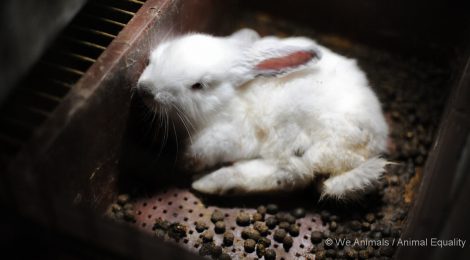
Get Rabbits Out Of Battery-Cages
The lives of rabbits farmed for their meat is a living hell. Conditions are so awful and disease, infection and parasites so rife that 25% of rabbits raised for meat die before even leaving the farm. They spend their lives confined to tiny, barren wire cages, unable to move freely or express their natural desires to dig, hop or hide.
The National Farm Animal Care Council has released its draft recommendations for the care and handling of farmed rabbits. Shockingly, the council’s draft code continues to allow the use of battery cages.
Just a few days ago, the European Parliament voted in favour of drafting legislation to end the use of battery cages for rabbits. Some member States have already banned or are phasing out the use of battery cages for rabbits – Austria banned the cages in 2012, and Belgium began phasing them out in 2014 with the goal of moving to collective park systems by 2025. The UK introduced animal welfare legislation to specifically protect farmed rabbits back in 2007!
Let NFACC know that rabbits are just as worthy as pigs and chickens and don’t deserve a life of confinement. Complete the survey here with the help of our suggestions below.
1.1.2 Space Allowances
- The recommended minimum space allowances continue to prevent rabbits from expressing natural behaviours such as hopping, and are far below those being discussed in Europe.
- The use of battery cages should be prohibited in favour of the use of hutch systems or collective park systems as these provide more generous living space, permit social and locomotive behaviour and allow the rabbits an existence more closely resembling their natural state.
- Separate housing should exist for does when they are nursing a litter.
1.2 Environmental Refinements
- Rabbits should be provided with at least 2 types of refinements in all stages of production – 1 of which must be food-based to decrease the risks of repetitive behaviours.
- Platforms should be a requirement rather than a recommendation.
1.3 Flooring and Bedding
- Recommended Practices A and B should be requirements as the Scientific Report found that plastic-coated wire and the addition of a plastic resting mat decreased foot injuries.
- Recommended Practices C and D should be requirements as they reduce disease risks which negatively affect animal welfare.


